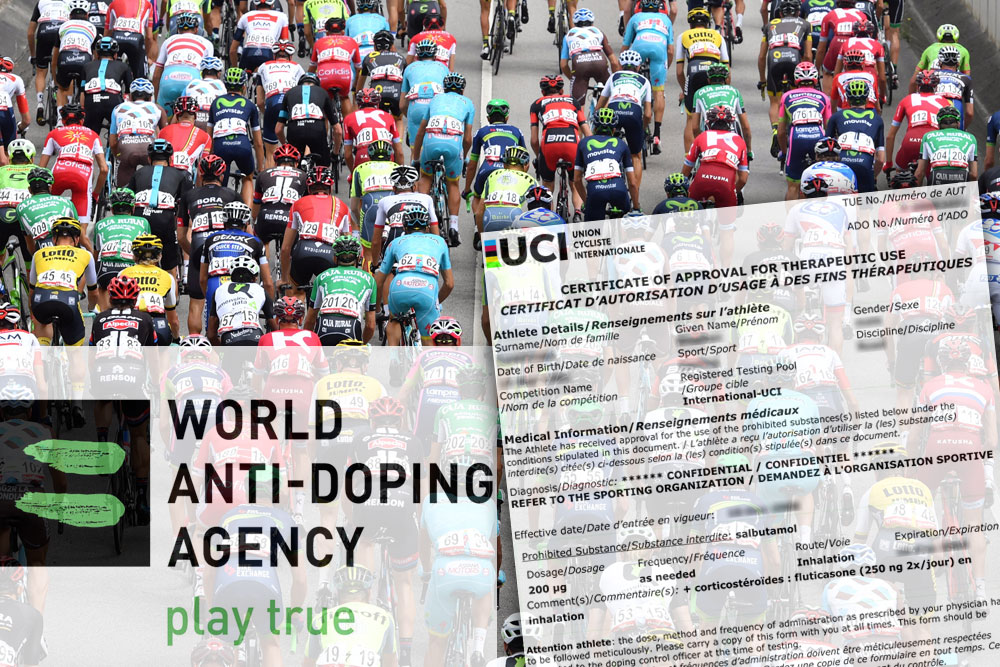'Athletes should not be required to publicly defend their legitimate use of a TUE' says WADA
World Anti-Doping Agency issues an information document to try and stop 'tremendous amount of misinformation' regarding therapeutic use exemption certificates - Organisation also explains how hackers obtained TUEs


The World Anti-Doping Agency (WADA) has said that athletes should not be required to publish their therapeutic use exemption (TUE) certificates and says they 'should [not] be required to publicly defend their legitimate use of a TUE'.
The statements were made as part of a 'frequently asked questions' (FAQ) document published by WADA on Tuesday evening in the light of the publication of TUEs from many athletes from a variety of sports by Russian hacking group, Fancy Bears.
WADA says that there is a lot of 'misinformation' relating to TUEs, and it hopes that the document clarifies their use. Several riders whose TUEs have been published have since made public statements regarding their documents, including British Olympic gold medallists Bradley Wiggins and Callum Skinner.
Fancy Bears illegally obtained the confidential TUEs from WADA's computer system by hacking into its files. The hacking group has been publishing them online, so far in five batches. TUEs are issued when an athlete requires a substance on WADA's Prohibited List for a legitimate medical reason.
>>> Chris Boardman backs calls to make TUEs public
"This situation has led to a lot of media coverage; and, unfortunately, a tremendous amount of misinformation as it relates to TUEs," said WADA.
"It is very unfortunate that athletes’ TUEs are being debated publically [sic] on the basis of partial, confidential, medical information. Athletes should not be required to publically justify their TUEs."
The latest race content, interviews, features, reviews and expert buying guides, direct to your inbox!
The TUE document is freely available to download from WADA's website, and outlines what TUEs are for, how and why they are granted to athletes, and whether they can be used to 'cheat'. It also explains how the TUEs were obtained by Fancy Bears and whether its computer system is secure.
Under a section of the document titled 'Why is information on athletes' use of TUEs not publicly disclosed?', WADA says:
"It is a fundamental human right that personal medical information be kept confidential. Nobody would want such information disclosed, let alone for it to be debated publically.
"Athletes should not be required to publish their TUE information, which may de facto disclose their disease or condition, nor should they be required to publically defend their legitimate use of a TUE.
"It is very unfortunate that, with the cyber-hacking situation, athletes’ TUEs are being debated publically on the basis of partial, confidential, medical information and misinformation as it relates to the TUE program.
"The TUE program is a rigorous and necessary part of elite sport; which has overwhelming acceptance from athletes, physicians and all anti-doping stakeholders."
On Monday evening, Team Sky principal Dave Brailsford said that the British WorldTour squad may publish TUEs issued to its riders in future.
WADA also explained in its FAQ document that its Anti-Doping Administration and Management System (ADAMS) is secure, and that there 'is no reason to believe' that Fancy Bears gained access to wider information on the confidential system.
"The cyber-attack was made possible by spear phishing of email accounts through which hackers gained access to ADAMS via an account created for the Rio 2016 Games," said the statement.
"WADA has no reason to believe that they have accessed the broader ADAMS system."

Nigel Wynn worked as associate editor on CyclingWeekly.com, he worked almost single-handedly on the Cycling Weekly website in its early days. His passion for cycling, his writing and his creativity, as well as his hard work and dedication, were the original driving force behind the website’s success. Without him, CyclingWeekly.com would certainly not exist on the size and scale that it enjoys today. Nigel sadly passed away, following a brave battle with a cancer-related illness, in 2018. He was a highly valued colleague, and more importantly, an exceptional person to work with - his presence is sorely missed.